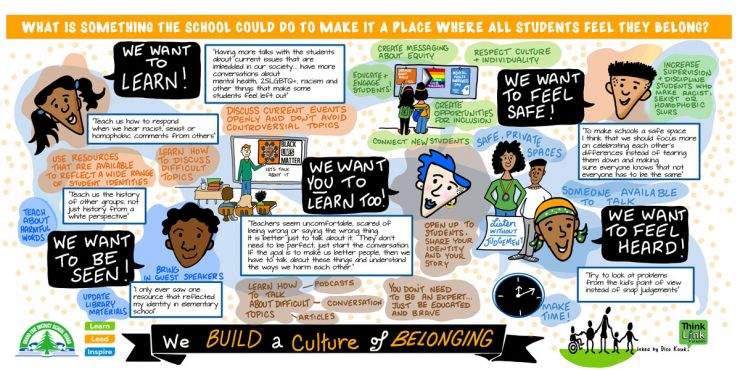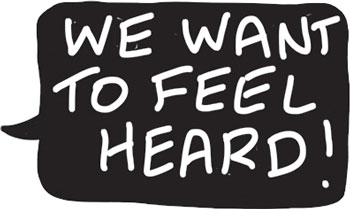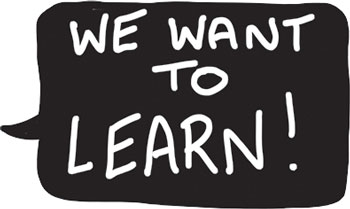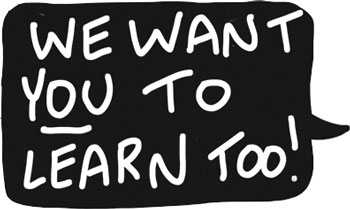- Athletics - Elementary
- Athletics - Secondary
- Child Care
- Multilingual Language Learners (MLL)
- EQAO Results
- French Language Programs
- Grand Erie Math Achievement Action Plan (GE-MAAP)
- Grand Erie Learning Alternatives (GELA)
- Graduate
- Indigenous Education
- Kindergarten
- Safe and Inclusive Schools
- Secondary School Profiles
- Secondary Programs
- Specialized Services

Student Voice Project
Equity and Inclusivity: Student Voice - Spring 2021 Background
As part of the work to make schools more inclusive and ensure that all students feel physically and emotionally safe, the Safe and Inclusive Schools Department reached out to all students in Grades 7 and 11 and invited them to talk about their school experiences in the form of a survey. The questions that were posed in the survey examined social issues that intersect with feeling included in a school or a community, including 2SLGBTQ+, bullying, impact of COVID-19, mental health, poverty and racism, asking students if they had talked about any of those issues in the classroom this past school year. (See Appendix A). An open-ended question sought input from students about “what schools could do to make it a place where all students feel they belong?”.
In addition to the surveys that were sent out, eight focus groups were facilitated virtually by Safe and Inclusive Schools during the month of July, with groups of grade 7 and 11 students from Brant, Haldimand and Norfolk, to further explore the question, “What can schools do to make it a place where all students feel they belong?”
Survey Results
In total, there were 552 responses to the survey; 276 students from Grade 11 and 268 students from Grade 7. Eight students did not identify their grade.
Student reported that it’s rare for issues related to 2SLGBTQ+ (73%) or poverty (70%) be discussed in class. There are also large percentages of students that report issues such as bullying, safe spaces, COVID-19, mental health or racism are never discussed in their classroom. (16%-24%). The chart below summarizes the frequency of which these topics are discussed.
This school year, have you talked about any of the following in your class?

Focus Group Results
A total of 95 students volunteered to be part of student focus groups, and out of that group 30 students participated, representing all three areas of the Board and both grades 7 and 11.
The following is a summary of the key themes and findings from the suggestions that students made in both the survey and during focus group discussions.
Key Themes:
- We Want to Be Heard We Want to Learn
- We Want You to Learn, Too We Want to Be Seen
- We Want to Be Safe
We Want to Feel Heard:

- “Try to look at problems from the kid’s point of view instead of snap judgements.”
- “What they need is teachers to have the time and ability to listen to help them. To listen to students and not brush off their problems.”
- “I would recommend asking students who are part of minorities or other groups about different ways to make our school safe.”
Suggestions from the students:
- Have a way to report issues anonymously.
- Make time for us, be available.
- Be non-judgemental and approachable.
- Have a safe, private space and someone available to talk to kids.
- Provide ongoing opportunities for student voice and input, initiate focus groups, surveys in schools to make sure student voices are heard.
- Initiate more student support groups.
- Engage students in the solutions and how to improve things. We have ideas.
We Want to Learn:

- “Talk about it (equity and inclusivity) more in the classes. Yes, there’s activities and clubs that are about diversity and acceptance thought the year, but it is usually only the students in a minority that participate. A lot of the time people with the most privilege are ignorant about what minorities have to go through because it is not directly affecting them.”
- “Having more talks with the students about modern issues that are imbedded in our society. Educating students on micro- aggressions, normalized racism, general disrespect.”
- “Have more conversations about mental health, 2SLGBTQ+ and other things that make some students feel left out.”
- “Better educate students about the history of Black, Indigenous Persons of Colour and the LGBTQ+ communities and the discrimination they face.”
Suggestions from the students:
- Discuss current events openly.
- Don’t avoid topics you feel might be too controversial.
- Let us talk about current events.
- Talk about difficult subjects like racism, sexism and homophobia throughout the year not just once.
- Open up to students early about who you are, how you identify and that you are open to discuss difficult issues- don’t assume students know you are open to discussion.
- Begin speaking about issues like racism and homophobia in younger grades (elementary).
- Teach us why certain words are hurtful to certain groups and how to respond when we hear racist, sexist or homophobic comments from others.
- Increase messaging through posters, assemblies, bulletin boards, posters, spirit days.
We Want You to Learn Too

- “Teachers and staff could talk about these issues properly, they could educate themselves, so they know what they are actually talking about. Plus, speak about such issues like they effect people because they do. Many staff and teachers speak about these like hypothetical issues, these are real and effect not just people outside of the school but in the school too.”
- “I believe by simply educating the teachers (you will increase sense of belonging). I have not personally experienced but have witnessed cases of teachers being judgmental and rude to students that are either of a different race or sexual orientation.”
- “Teachers seem uncomfortable, scared of being wrong or saying the wrong thing. It is better just to talk about it. They don’t need to be perfect, just start the conversation. If the goal is to make us better people, then we have to talk about these things and understand the ways we harm each other.”
Suggestions from the students:
- Look at your own thoughts and values about things because this will come across when you talk to students.
- Teachers need help knowing what to say and how to talk about difficult topics.
- Teachers need to know how to facilitate discussion, set boundaries to keep conversations safe.
- Try to become comfortable and more educated about these topics, but know that you don’t need to be an expert.
We Want to Be Seen

- “I only ever saw one resource that reflected my identity in elementary school…we need to see ourselves in the content that is taught.”
- “If things like preferred name and pronouns were included in the introductions then it doesn’t force trans people to stick out as much and make it more normal in the classroom.”
- “We need to learn more about a global perspective and not just a Eurocentric viewpoint- that isn’t preparing us for the current world.”
- “When diversity is not recognized you are not respecting people’s culture and individuality.”
Suggestions from the students:
- Teach history of other groups not just history from a white perspective.
- Allow students to do some teaching about their own culture.
- Have diverse materials available in the classroom that students have access to that reflect a wide range of identities.
- Bring in guest speakers if you don’t know a lot about a topic.
- Update library materials.
- Ensure representation of different groups so all students can see themselves reflected in the curriculum and the resources.
- Provide culture days to celebrate different culture’s food, clothing and traditions.
- Provide more diversity in food choices in the cafeteria.
- Provide a space for prayer in schools.
- Ensure gender neutral bathrooms.
- Announcements and celebrations about different holidays and celebrations from different cultures.
- Allow students to use preferred pronouns on their Teams profile.
- Provide Pride and Black Lives Matter flags in the classrooms.
We Want to Feel Safe

- “I go to school worried about being called homophobic slurs in the hallways. I see people I go to see posting racial slurs and homophobic slurs on their Snapchats.”
- “The amount of slurs I hear from everyone in the hallways is actually embarrassing. I feel scared walking through the hallway most days, because it is intimidating, and I do not feel welcome.”
- “Stop tolerating students who contribute to harmful ideas and atmospheres and start believing students who speak up about being bullied or harassed.”
- “To make schools a safe space I think that we should focus more on celebrating each other’s differences instead of tearing them down and making sure everyone knows that not everyone has to be the same.”
- “Make it a positive space mentally and physically. Have the classroom now only be somewhere to learn but somewhere to feel comfortable. Plants, calming brighter colours, welcoming teachers provide children with comfort to be themselves.”
Suggestions from the students:
- Provide more opportunities for students to feel included.
- Involve older students in supporting younger students.
- Connect students to other students as they start high school or are new to a school.
- Have a comfortable place where distressed students can go. Don’t make it obvious.
- Avoid favouring some students over others.
- Provide activities to break down social cliques. It is hard to get to know students in other groups.
- Encourage classes to work together.
- Have mixed gender teams for sports.
- Build relationships with students.
- Make mental health resources more available.
- Check in with vulnerable or quiet students.
- Increase supervision including on the bus.
- Increase punishment for students who bully or make racial, sexist or homophobic slurs.
- Look for problematic interactions between kids.
- Educate people who bully about what they are saying and doing that is wrong and how it hurts others.
- Include students who are involved in a situation as you investigate it and discipline.
- Understand there is a mind set around ‘snitching’ and the worry that things will get worse if we tell.
Conclusion
The Student Voice Project unveiled themes that are consistent with the best practices of culturally responsive pedagogy and serves to highlight the foundational and timeless concept of the importance of the relationship between students and adults in the school. Students are clearly asking us to discuss social issues in the context of their classrooms and are looking to adults to get prepared, be brave and lead these conversations. Students also would like Grand Erie to expand opportunities for student voice to have a meaningful impact at a school and Board level.
This summary provides suggestions for staff teams to consider as they reflect on both their individual and school practices. It is noteworthy to highlight that students see themselves as both learners and teachers and are looking for opportunities to work collaboratively as we build a culture of belonging in Grand Erie together.
